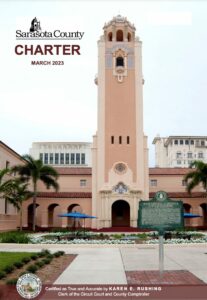Sarasota will vote to fill six seats on the 10-seat Charter Review Board this year.
By Johannes Werner
Original Air Date: July 5, 2024
Host: The Sarasota Charter Review Board is the beholder of our local constitution, the county charter. And it is the stage of an epic battle between developers eager to build more subdivisions beyond existing boundaries, and residents wary about rapid construction and political influence by businesses. Fourteen candidates have lined up to be elected to that volunteer board this year. Our news team explains what it’s all about.
Ray Collins: Thank you, Madam Clerk. Six-to-two, vote no. We have now had a motion to docket this amendment, which failed. A motion to postpone this amendment, which failed. A motion to request further direction from the county attorney’s office, which passed. It seems the only alternative motion that has not been made is a motion to not docket this proposed amendment, which would in effect render the further request of the county attorney’s office moot. So the floor is open.
 Johannes Werner: This was Sarasota County Charter Review Board Chair Ray Collins, tussling during a meeting in May with board member Alexandra Coe about her repeated efforts to repeal a statute that she says essentially blocks any changes to the charter.
Johannes Werner: This was Sarasota County Charter Review Board Chair Ray Collins, tussling during a meeting in May with board member Alexandra Coe about her repeated efforts to repeal a statute that she says essentially blocks any changes to the charter.
Amendment 7.1a was inserted into the county charter after a referendum in 2022. Critics allege that the question in that referendum misled voters, because it hid its blocking impact. But it’s now part of the charter, and it says amendments must comply with Florida law and the existing charter. But amendments, just by the nature of what they are, do change the existing charter, which could be interpreted as a violation. 7.1a was promoted by county commissioners and developers after they were unable to reverse a grassroots-driven change of county commission elections from county-wide to local districts.
In two efforts to repeal the 2019 landslide, bipartisan vote for single-member districts, developer-friendly county commissioners hit a wall with voters. More than 60 percent of Sarasota County voters seem restless about the rapid pace of new development, and hopeful that county commissioners will be more accountable to them — rather than developers — if they are elected in the district they live in.
County Commission aside, the Charter Review Board is the main political stage of an epic effort by developers to facilitate more suburban growth and prevent a next moratorium against new construction. There’s a history of moratoria. Concerned Sarasota voters did effectively stop new development for a short period in the early 1990s, and tried again in the early 2000s. This is why prominent developers have put effort and funds into controlling the Charter Review Board with development-friendly candidates. Many of those Charter Review Board members later move on to become county commissioners.
Another way the county commission has used to push back against voters is through the courts. When the Charter Review Board allowed for a referendum about the privatization a county-owned road on Siesta Key — and the privatization of any public assets with ocean vistas — it won. But the county commission sued, and a court ruling disabled these amendments.
All this is why the 10-member Charter Review Board is now seeing a lot of interest by diverse candidates. The 14 running for five open seats include nine Republicans — both of the developer-friendly and of the developer-skeptical America First and libertarian variety — and five Democrats are running five candidates for the six open seats.
Since this is a partisan election, there will be Republican primaries on Aug. 20, before the winners of the primaries duke it out with Democrats on Nov. 5.
Republican Alex Coe recently resigned from her Charter Review Board seat in District 1, as she is now running for county commission. This is creating the only race that will be decided in the Aug. 20 Republican primaries. Trying to fill Coe’s shoes for the remaining two years as a 7.1a opponent is Libertarian Caucus member William D. Van Allen. He is up against Republican Nicholas Altier.
The other District 1 seat will be decided in November, with developer-friendly incumbent Republican Jay Riley going against Democrat Julie Forestier.
The District 2 seat race is pitting Democrat Dale Anderson against Republican Stephen Webber on Nov. 5.
In District 3, developer-friendly incumbent Thomas DeSane is facing Republican James Nelson Coler in the Aug. 20 primaries. The winner will go against Democrat Brad Hardin in November.
District 4 pits two Republicans — George Thomas Aiton and America First conservative Gregory Scott Bukowski — against each other in the primaries on Aug. 20. The winner will run against Democrat Robin Williams — a high-profile school board activist — in November.
And finally, District 5 will be up in November, with America First-endorsed Republican José William Jiménez going against Democrat Nancy Ceci.
For more details about the Charter Review Board and the candidates, go to https://wslr.org/sarasota-county-elections/. The Charter Review Board races are at the bottom of that page.
This has been Johannes Werner, reporting for WSLR News.
WSLR News aims to keep the local community informed with our 1/2 hour local news show, quarterly newspaper and social media feeds. The local news broadcast airs on Wednesdays and Fridays at 6pm.